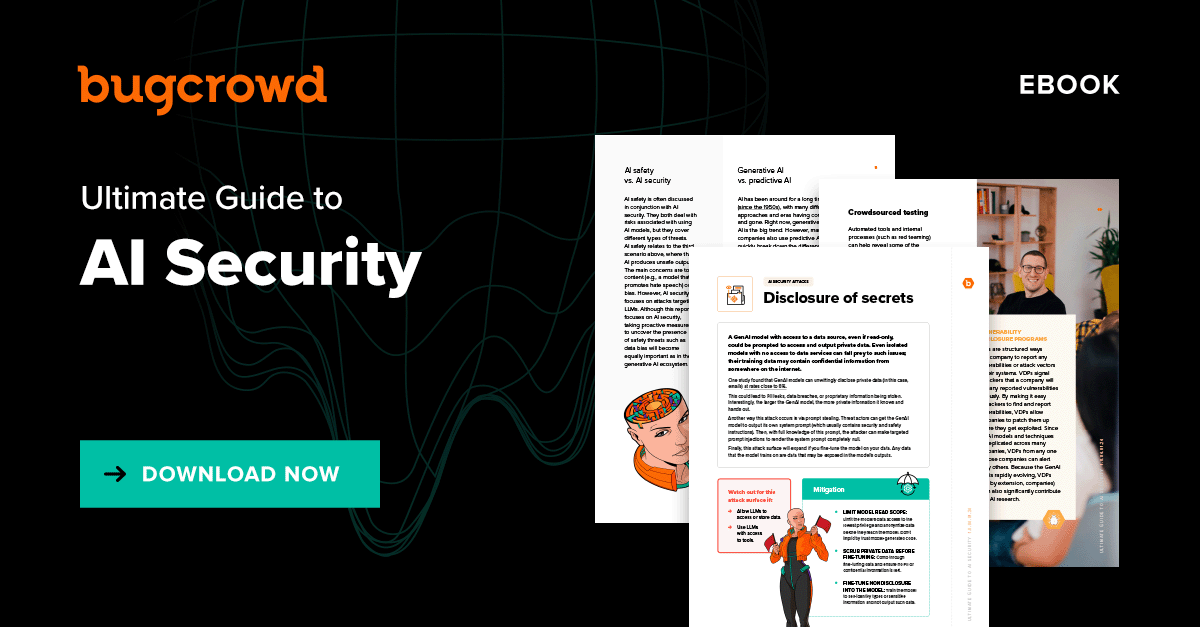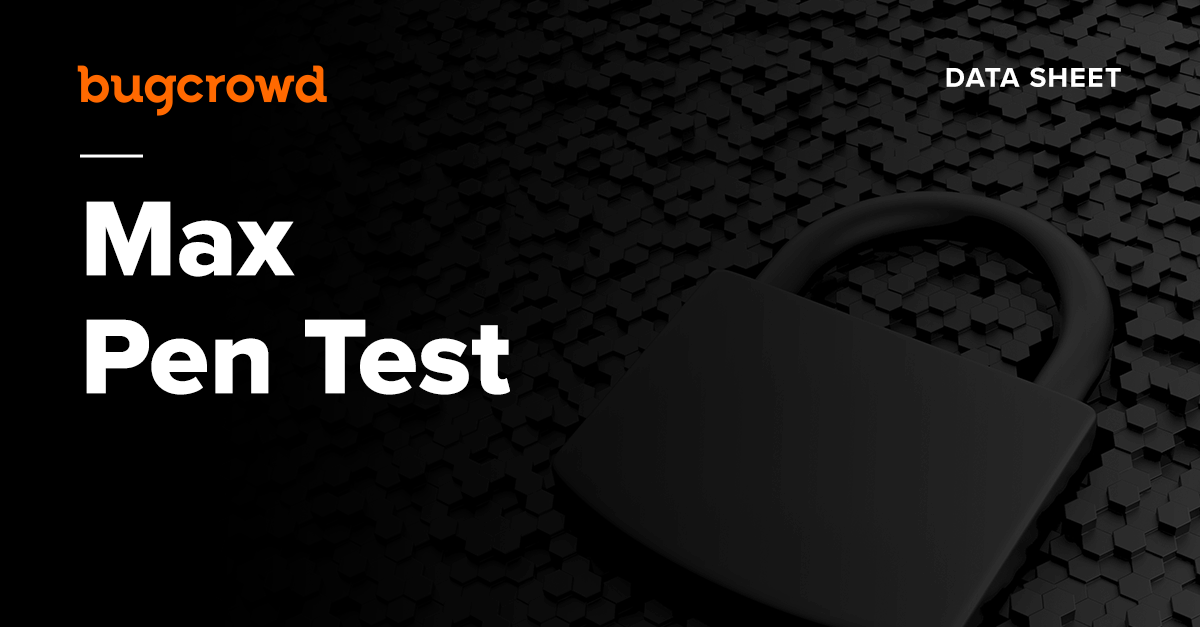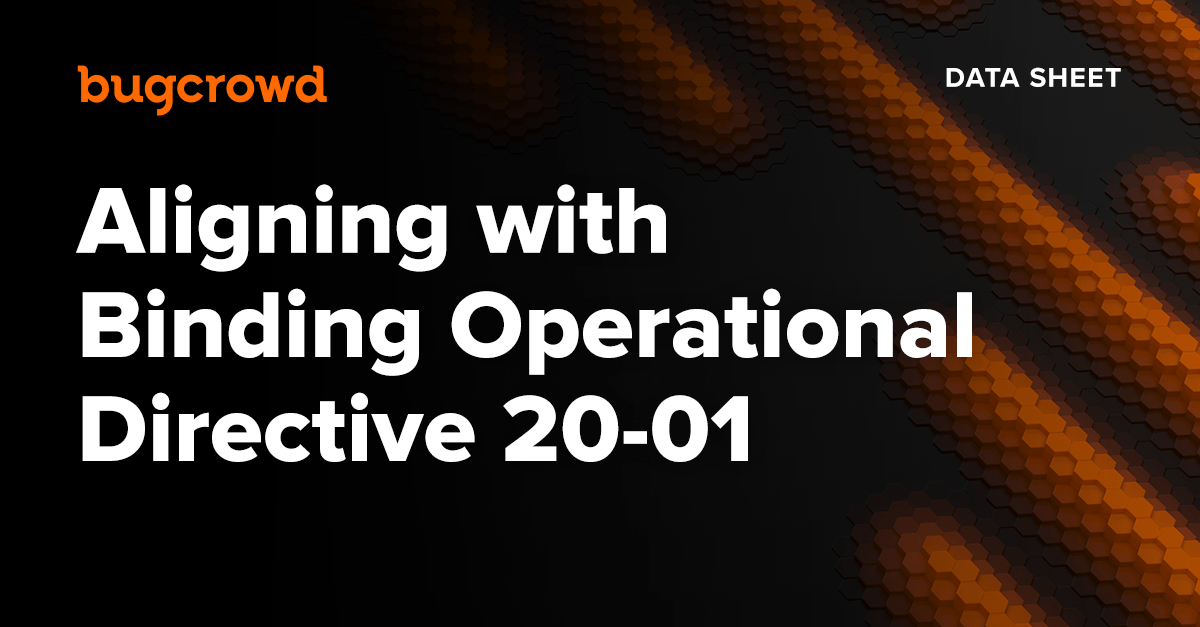
This web page represents a legal document with terms and conditions applicable to all individuals who have registered user names (also known as a “handle”) with Bugcrowd Inc. (“Bugcrowd”) through the Bugcrowd website. In addition, the terms and conditions contained in our Code of Conduct, Disclosure Policy and Terms of Service (along with these Standard Disclosure Terms, collectively, the “Researcher Terms and Conditions”) are incorporated by reference into these Standard Disclosure Terms. Upon obtaining a user name with Bugcrowd, you are referred to as a “Researcher” and you are bound by and are obligated to comply with the Researcher Terms and Conditions.
THE SUBMISSION PROCESS
If you believe you have discovered a vulnerability, please create a submission for the appropriate program through the Crowdcontrol platform. Each program has a set of guidelines called the Program Brief. The program brief is maintained by the Program Owner. Terms specified in the program brief supersede these terms.
Each submission will be updated with significant events, including when the issue has been validated, when we need more information from you, or when you have qualified for a reward.
Each submission is evaluated by the Program Owner on the basis of first-to-find. Bugcrowd may assist in the evaluation process.
You will qualify for a reward if you were the first person to alert the Program Owner to a previously unknown issue AND the issue triggers a code or configuration change.
STANDARD PROGRAM RULES
We are committed to protecting the interests of Security Researchers. The more closely your behavior follows these rules, the more we’ll be able to protect you if a difficult situation escalates.
Rules can vary for each program. Please carefully read the program brief for specific rules. These rules apply to all programs:
- Testing should be performed only on systems listed under the program brief ‘Targets’ section. Any other systems are Out Of Scope.
- Except when otherwise noted in the program brief, you should create accounts for testing purposes.
- Submissions must be made exclusively through Crowdcontrol to be considered for a reward.
- Communication regarding submissions must remain within Crowdcontrol and/or official Bugcrowd support channels for the duration of the disclosure process.
- Actions which affect the integrity or availability of program targets are prohibited and strictly enforced. If you notice performance degradation on the target systems, you must immediately suspend all use of automated tools.
- Submissions should have impact to the target’s security posture. Impact means the reported issue affects the target’s users, systems, or data security in a meaningful way. Submitters may be asked to defend the impact in order to qualify for a reward.
- Submissions may be closed if a Researcher is non-responsive to requests for information after 7 days.
- The existence or details of private or invitation-only programs must not be communicated to anyone who is not a Bugcrowd employee or an authorized employee of the organization responsible for the program.
- We encourage Researchers to include a video or screenshot Proof-of-Concept in their submissions. These files should not be shared publicly. This includes uploading to any publicly accessible websites (i.e. YouTube, Imgur, etc.). If the file exceeds 100MB, upload the file to a secure online service such as Vimeo, with a password. For more details, please refer to our Reporting a Bug documentation.
- Bugcrowd’s Disclosure policies apply to all submissions made through the Bugcrowd platform, including Duplicates, Out of Scope, and Not Applicable submissions. Customers may select Nondisclosure, Coordinated Disclosure, or Custom Disclosure policies to be applied to their program brief. Please refer to our Additional Disclosure Policies for details on the different Public Disclosure Policies at Bugcrowd.
- If a Researcher wants to retain disclosure rights for vulnerabilities that are out of scope for a bounty program, they should report the issue to the Program Owner directly. Bugcrowd can assist Researchers in identifying the appropriate email address to contact. Program Owners are encouraged to ensure their program scope includes all critical components they wish to receive vulnerability reports for.
- Violation of a program’s stated disclosure policy may result in enforcement action as outlined in the Bugcrowd Terms and Conditions.
You must be at least 18 years old or have reached the age of majority in your jurisdiction of primary residence and citizenship to be eligible to receive any monetary compensation as a Researcher. Additional applicable eligibility requirements are stated in the Terms of Service. Exceptions with respect to a minor’s participation in Bug Bashes may be considered on a case-by-case basis as between Bugcrowd and the applicable minor’s guardian(s).
USERNAMES AND PASSWORDS
You will need to set up an account and user name in order to be a Researcher. You may not use a third party’s account without permission. When you are setting up your account, you must give us accurate and complete information. This means that you cannot set up an account using a name or contact information that does not apply to you, and you must provide accurate and current information on all registration forms that are part of the Website. You may only set up one account. You have complete responsibility for your account and everything that happens on your account. This means you need to be careful with your password. If you find out that someone is using your account without your permission, you must let us know immediately. You may not transfer your account to someone else. We are not liable for any damages or losses caused by someone using your account without your permission. However, if we (or anyone else) suffer any damage due to the unauthorized use of your account, you may be liable. Bugcrowd may deny the use of certain user names or require certain user names be changed at Bugcrowd’s sole discretion and/or to comply with end customers’ requirements. User names with offensive or discriminatory words are prohibited.
ADDITIONAL RESOURCES INCORPORATED INTO THESE TERMS
A violation of these rules may result in the invalidation of submissions, and forfeiture of all rewards, for current and future programs on the Bugcrowd platform.
Excluded Submission Types
Some submission types are excluded because they are dangerous to assess, or because they have low security impact to the Program Owner. This section contains issues that Bugcrowd does not accept, will be immediately marked as invalid, and are not rewardable.
- Findings from physical testing such as office access (e.g. open doors, tailgaiting).
- Findings derived primarily from social engineering (e.g. phishing, vishing).
- Findings from applications or systems not listed in the ‘Targets’ section.
- Functional, UI and UX bugs and spelling mistakes.
- Network level Denial of Service (DoS/DDoS) vulnerabilities.
Common “Non-qualifying” Submission Types
Some submission types do not qualify for a reward because they have low security impact to the program owner, and thus, do not trigger a code change. This section contains a listing of issues found to be commonly reproducible and reported but are often ineligible. We strongly suggest you do not report these issues unless you can demonstrate a chained attack with higher impact.
- Descriptive error messages (e.g. Stack Traces, application or server errors).
- HTTP 404 codes/pages or other HTTP non-200 codes/pages.
- Banner disclosure on common/public services.
- Disclosure of known public files or directories, (e.g. robots.txt).
- Clickjacking and issues only exploitable through clickjacking.
- CSRF on forms that are available to anonymous users (e.g. the contact form).
- Logout Cross-Site Request Forgery (logout CSRF).
- Presence of application or web browser ‘autocomplete’ or ‘save password’ functionality.
- Lack of Secure and HTTPOnly cookie flags.
- Lack of Security Speedbump when leaving the site.
- Weak Captcha / Captcha Bypass
- Username enumeration via Login Page error message
- Username enumeration via Forgot Password error message
- Login or Forgot Password page brute force and account lockout not enforced.
- OPTIONS / TRACE HTTP method enabled
- SSL Attacks such as BEAST, BREACH, Renegotiation attack
- SSL Forward secrecy not enabled
- SSL Insecure cipher suites
- The Anti-MIME-Sniffing header X-Content-Type-Options
- Missing HTTP security headers, specifically (https://blog.veracode.com/2014/03/guidelines-for-setting-security-headers/)
Program Rewards
You will qualify for a reward if you were the first eligible person to alert the Program Owner to a previously unknown issue AND the issue triggers a code or configuration change. Reward details vary for each program. Rewards can take the form of USD, Bugcrowd Points, CPE Points and/or Swag. Please carefully read each program brief for specific details.
Each submission’s reward amount is based on the business impact, severity, and creativity of the issue. Bugs found in applications, features, and functions called out in the program brief as an “Focus Area(s)” are awarded at higher levels.
Valid submissions also count towards ISC 2 Continuing Professional Experience (CPE) credits. If you’re an ISC2 certification holder please make sure you’ve updated your ISC2 ID in the portal.
If you become eligible for a monetary award, to get paid, you may need to: (a) provide additional verification and tax information, (b) fulfill various eligibility requirements and (c) agree to additional terms and conditions with a third party payment processor. Taxes on monetary rewards paid to you are your sole responsibility and monetary rewards which remain unclaimed or undeliverable for a period of six (6) months will be forfeited.
Intellectual Property; Ownership of Testing Results
You hereby represent that you have obtained the necessary approvals and consents from all third parties including your employer for the purpose of participating as a Researcher.
For the purposes of this section, “Testing Results” means information about vulnerabilities discovered on the Target Systems discovered, found, observed or identified by Researchers” and “Target Systems” are the applications and systems that are the subject of the Testing Services.
You hereby agree and warrant that you will disclose all of the Testing Results found or identified by you (“your Testing Results”) to Bugcrowd. Furthermore, you hereby assign to Bugcrowd and agree to assign to Bugcrowd any and all of your Testing Results and rights thereto. To the extent any rights in your Testing Results are not assignable, you shall grant and agree to grant to Bugcrowd under any and all such rights an irrevocable, paid-up, royalty free, perpetual, exclusive, sub-licensable (directly or indirectly through multiple tiers), transferable, and worldwide license to use and permit others to use such Testing Results in any manner desired by us (and/or our customers and sponsors) without restriction or accounting to you, including, without limitation, the right to make, have made, sell, offer for sale, use, rent, lease, import, copy, prepare derivative works, publicly display, publicly perform, and distribute all or any part of such Testing Results and modifications and combinations thereof and to sublicense (directly or indirectly through multiple tiers) or transfer any and all such rights. Further, you shall waive and agree to waive in favor of Bugcrowd any moral right or other right or claim that is contrary to the intent of a complete transfer of rights to Bugcrowd in your Testing Results.
You hereby authorize us and any Bug Bounty Program or Bug Bash sponsors to publicize your Testing Results, including account name (handle), and any additional information as may be required by the Program Brief. Any such Program Brief may request certain personally identifiable information about you be provided to the Program Owner and your agreement to participate in such Bug Bounty Program or Bug Bash indicates your consent to provide such information.
Confidentiality Obligations
“Confidential Information” means any information that is marked or otherwise designated as confidential at the time of disclosure or that a reasonable person would consider confidential based on the circumstances and content of the disclosure, and includes, without limitation: customer information, personally identifiable information, financial information, information regarding Target Systems, information regarding the target of a crowdsourced security program (including, as may be applicable, any merger, acquisition or sale discussions or transactions), pricing information, business information, fees and amounts paid to Researchers and existence of and terms of private crowdsourced security programs. Confidential Information does not include information that: (i) is or becomes known to the receiving party from a source other than one having an obligation of confidentiality to the disclosing party; (ii) is or becomes publicly known or otherwise ceases to be confidential, except through a breach of this Agreement; or (iii) is independently developed by the receiving party.
You agree that you will (i) hold in confidence and not disclose to any third party any Confidential Information, except as approved in writing by disclosing party; (ii) protect such Confidential Information with at least the same degree of care that the Researcher uses to protect its own Confidential Information, but in no case, less than reasonable care; (iii) use the disclosing party’s Confidential Information for no purpose other than the use permitted by the disclosing party; and (iv) immediately notify disclosing party upon discovery of any loss or unauthorized disclosure of disclosing party’s Confidential Information.
ALL SUBMISSIONS ARE CONFIDENTIAL INFORMATION OF THE PROGRAM OWNER UNLESS OTHERWISE STATED IN THE BOUNTY BRIEF. This means no submissions may be publicly disclosed at any time unless the Program Owner has otherwise consented to disclosure. Please see the Bugcrowd Public Disclosure Policy for a more fulsome description regarding disclosure of vulnerabilities in connection with Bug Bounty Programs.
With respect to the Confidential Information of Researchers, please refer to the Bugcrowd privacy policy available at https://www.bugcrowd.com/privacy
Official Support Channels and Private Communication
During the course of each program, the Bugcrowd team may communicate updates via:
- ‘Program Updates’ section within the program.
- Email.
If you have questions about a program or a specific submission, you may contact the Bugcrowd team via:
- Crowdcontrol Submission Messages.
- support@bugcrowd.com.
Public Communication
The Bugcrowd team can be publicly contacted via the following channels. DO NOT communicate specifics about a program via these channels.
- @bugcrowd
- IRC at irc.freenode.com in the #bugcrowd channel.
Updates to these terms
All updates to this page will be listed below.
- 1:15 PM Monday, August 24, 2020 (PST) – Updated Confidentiality Obligations
- 1:48 PM Thursday, December 13, 2018 (PST) – Updated Confidentiality Obligations, Intellectual Property, and Username Guidelines
- 10:30 AM Tuesday, February 13, 2018 (PST) – Updated PoC attachment guidelines.
- 11:20 AM Tuesday, October 10, 2017 (PST) – Non-response submission closure policy updated from 14 days to 7 days.
- 12:00 PM Wednesday, December 2, 2015 (PST) – Removed ‘HTTPS Mixed Content Scripts’ from non-qualified submission types
- 4:30 PM Wednesday, April 29, 2015 (PST) – Added clause about communicating existence or details of private or invitation-only programs
- 10:41 AM Friday, January 02, 2015 (PST) – Lowered 30 day non-responsive clause to 14 days
- 1:27 PM Wednesday, November 26, 2014 (PST) – Added 30 day non-responsive clause
- 9:28 AM Thursday, October 2, 2014 (PST) – Added “Common “Non-qualifying” Submission Types”
- 4:54 PM Wednesday, July 30, 2014 (PST) – Added “Weak Captcha” to list of Low impact issues
- 11:28 PM Sunday, May 18, 2014 (PST) – Clarified effects of failure to abide by rules (invalidation of submissions and forefeiture of all rewards, current or future, on the platform)
- 1:28 PM Wednesday, April 23, 2014 (PST) – Added: ”
- Submissions should have impact to the target’s security posture. Impact means the reported issue affects the target’s users, system / network security, or data security in a meaningful way. Submitters may be asked to defend the impact in order to qualify for a reward.”
- 11:54 PM Tuesday, April 15, 2014 (PST) – “havelow” -> “have low”, thanks @historypeats
- 04:11 PM Wednesday, April 07, 2014 (PST) – Clarified “SSL settings” submission type
- 10:09 AM Wednesday, April 02, 2014 (PST) – Clarified support channel
- 5:01 PM Tuesday, April 01, 2014 (PST) – Clarified DOS/DDOS exclusion
- 3:04 PM Monday, March 31, 2014 (PST) – Initial Release
Get Started with Bugcrowd
Every minute that goes by, your unknown vulnerabilities leave you more exposed to cyber attacks.


